Is clover taking over your lawn and destroying the once lush and lovely green landscape that you have worked so hard to establish? There is a good likelihood that your yard is plagued with a common lawn disease or that a well-intentioned lawn maintenance strategy is enabling the clover to creep into your grassy kingdom. In this article, let’s talk about will clover take over grass.
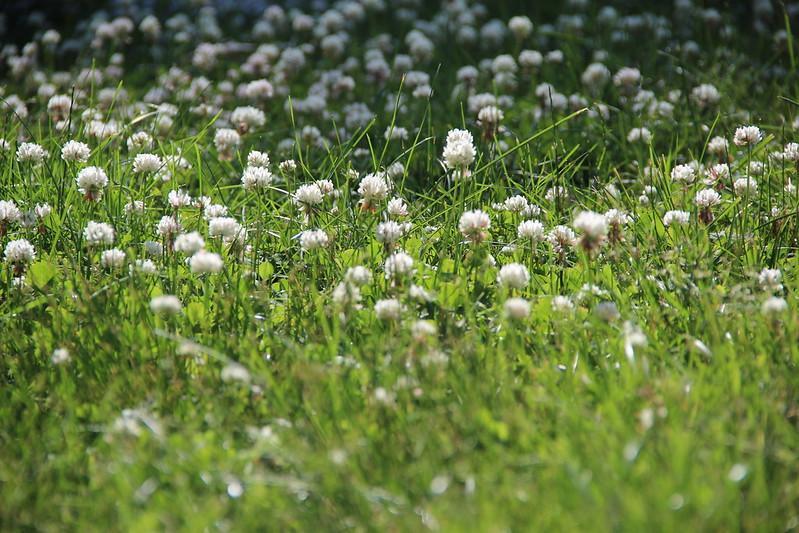
Clovers may take over portions of your yard if the grass there is patchy or brown.
There is a widespread but mistaken assumption that clovers will eventually take over your grass and make your lawn unusable. In reality, however, clover does not often out-compete grass and can even provide benefits as part of a well-maintained lawn.
For example, planting clover on your lawn will help keep the grass healthy since it adds nitrogen to the soil and acts as a natural fertilizer. Nevertheless, depending on the conditions of the yard, the growth of clover can sometimes get out of hand.
Low nitrogen content and a soil pH between 6.0 and 8.5 are ideal growing conditions for clover. Clover will flourish in areas where the grass is cut shorter than 3.5 inches and if the soil is compacted and lacks adequate aeration. When these four key care and maintenance criteria are met, the clover will take over the grass.
That being said, there is much more to clovers in your yard than just compacted soil and low nitrogen content. Read on to find out!
Reasons Why Clover Is Invading Your Grass!
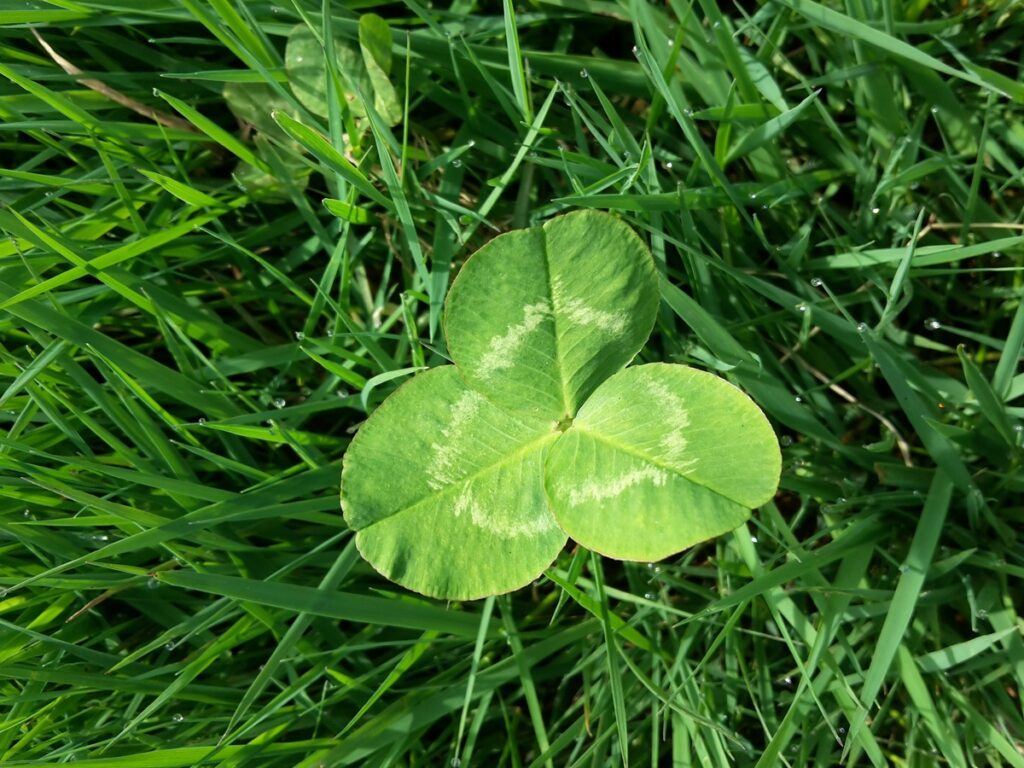
Clover spreads quickly and grows densely in poor soil conditions.
Clovers will not crawl into a lawn unless they have a hidden access point. If you do nothing to stop it, white clover is an invasive perennial that will continue to return every year and eventually take over your grass. Therefore, it is essential that you have an understanding of the conditions under which it can thrive and outpace the grass on your lawn.
Lots Of Sunshine
The vast majority of turfgrasses adore the sun, and so does clover. The presence of sunlight on its own is insufficient to cause an infestation of clover on your lawn. However, the presence of the sun in conjunction with other issues with your lawn, such as compacted soil or over-mown grass, might cause clover to begin invading your lawn.
Solution
Always strive to achieve the highest possible level of grass health. If you know that your lawn is more likely to have clover than other types of grass, you must provide as few opportunities for clover to grow as possible. Your yard can be kept free of clover with the help of overseeding, fertilizing, aeration, and adequate watering.
Planting Wrong Grass
In conditions of low temperature and high humidity, clover grows the best. And what about grass? Well, it depends. Depending on your climate, you’ll need either warm-season grass, cool-season grass, or a combination of the two. In the United States, clover is found primarily in the northern and central regions, characterized by cool-season grasses.
In these areas, clover has an easier time taking over a yard dominated by warm-season grasses such as Bermuda grass, St. Augustine grass and Zoysia grass than a lawn dominated by cool-season grasses. Also, if you grow the wrong type of grass for your region’s yard, it will struggle to adapt to the environment, and as a result, it is more likely to become infected with diseases, wilt, and eventually die.
That provides clover with the ideal opportunity to establish itself in your grass.
Solution
Check that the grass you’re planting is suitable for the area in which you live. You can get guidance on seeding from the cooperative extension office in your area if you are unsure which type of grass will thrive in your area the best.
Overwatering Or Underwatering
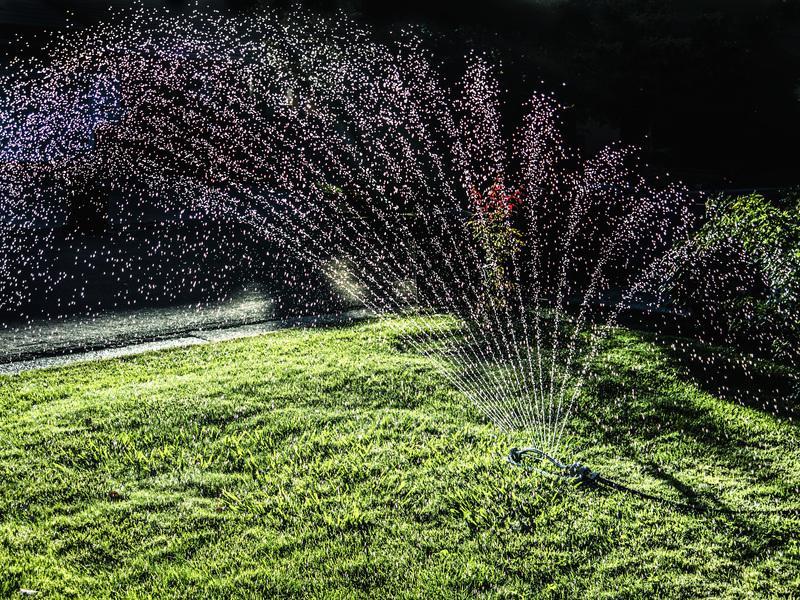
Overwatering can make grass prone to diseases, weakening the grass and creating an entry point for clover.
Too little or too much of a good thing is… Well, you are familiar with the proverb, and it most certainly holds true when it comes to watering your grass. When grass is overwatered, it develops fungus and disease, its roots become shallow, and the soil becomes compacted.
All of these things are bad news for the grass, as they provide easy access for clover as well as a large number of other broadleaf weeds. On the other hand, your grass will become wilted, discolored, and unable to compete with clover if you water it too little, as clover plants tolerate water stress and drought better than turf grasses.
Solution
Maintain a regular watering schedule for your grass, but avoid watering it lightly and frequently. Give your grass a weekly drink of 1 to 1.5 inches of water (or break the watering into two times per week). It is ideal for water to penetrate the soil between 6 and 8 inches, which will provide your roots with a healthy soak. This will allow the grass roots to develop deeper, making them more resistant to drought.
Be sure to water your grass first thing in the morning, before 10 o’clock. It is best not to water your grass at night because doing so encourages fungus and diseases.
Related: Is A Clover Lawn Worth The Money? | Pros & Cons Of Owning A Clover Lawn
Mowing Too Short
You might believe that cutting the grass very close to the ground will discourage the clover from growing, but in reality, it will merely stress out your grass and create an entry point for the clover to invade a lawn. However, when you raise the height of your mower to three inches or more, the grass gains the upper hand, and it can compete with clover better.
It is because longer grass prevents the lower-growing clover from receiving sunlight and thus renders the clover incapable of obtaining the upper hand.
Solution
If you want your grass to be able to compete with clover, you should raise the cutting height on your mower to the highest setting and mow your lawn higher than three inches. Observe the “one-third rule” to keep your grass from becoming overworked. This entails that you should not remove more than a third of the grass height during any given mowing.
Unbalanced Soil pH
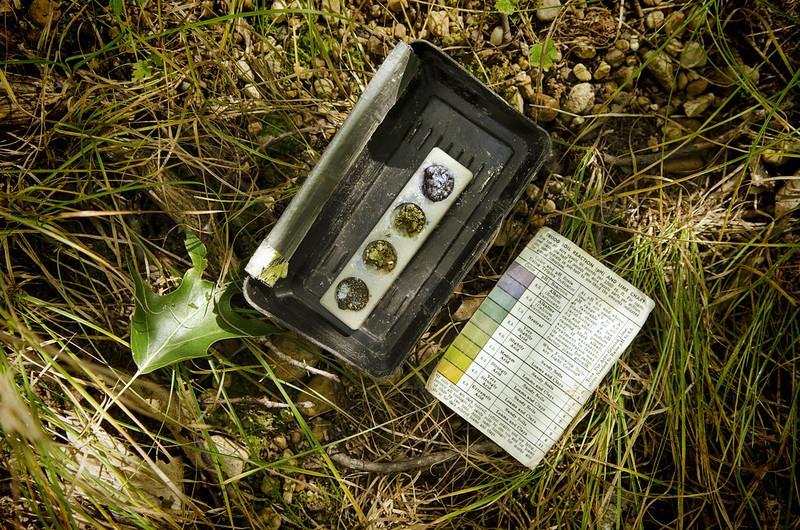
Soil pH that is either too high or too low can promote clover growth instead of grass.
The optimal pH range for grass growth is between 6.0 and 7. However, clover is hardy and can enter the picture if your soil is excessively acidic or too alkaline (basic).
In spite of the fact that most varieties of clover prefer a pH in the range of 6.0 to 7.0, these plants are able to survive more extreme pH values than grass.
Strawberry clover can grow in soils with a pH of 5.3 to 8.2, whereas Alsike clover can grow with a pH as low as 5.5. Likewise, red clover can grow in soils with a pH greater than 7.0.
Solution
First, you should get the soil on your lawn tested, and then you should make any necessary amendments. Get information on how to test your soil by getting in touch with the cooperative extension office in your area as a first step.
Once you have determined the pH of your soil, you will be able to alter its composition to make it more suitable for growing grass. Lime or wood ash should be added to acidic soil. In contrast, compost or sulfur can be added to the soil if it is too alkaline.
Low nitrogen levels
Because clover is a legume, it can extract nitrogen from the atmosphere and, as a result, provides a fertilizer boost to itself. That convenience is not available for turfgrass. In environments with insufficient nitrogen, grass has a hard time surviving, whereas clover does quite well. In fact, it serves as an indicator plant for soils deficient in nitrogen.
Solution
If you fertilize it with nitrogen, your grass will have a better chance of winning the battle against clover. And while grass will see healthier and more rapid growth as a result of nitrogen addition to the soil, clover will not benefit from these conditions.
In fact, nitrogen fertilizer can stunt the growth of legumes. Grass growth can be stimulated rapidly with a synthetic, fast-release fertilizer or encouraged gradually with an organic, slow-release fertilizer. The use of synthetic fertilizers with a rapid release is a quick remedy, but in the long run, it will deteriorate the soil and cause damage to the ecosystem.
On the other hand, if you use organic fertilizer, it will take longer for its effects to take effect, but in the end, you will have better soil, which will allow for more sustained grass growth. The following are some great examples of organic fertilizer options:
- Blood meal
- Bone meal
- Cow manure
- Earthworm castings
- Guano
- Liquid kelp
Soil Compaction
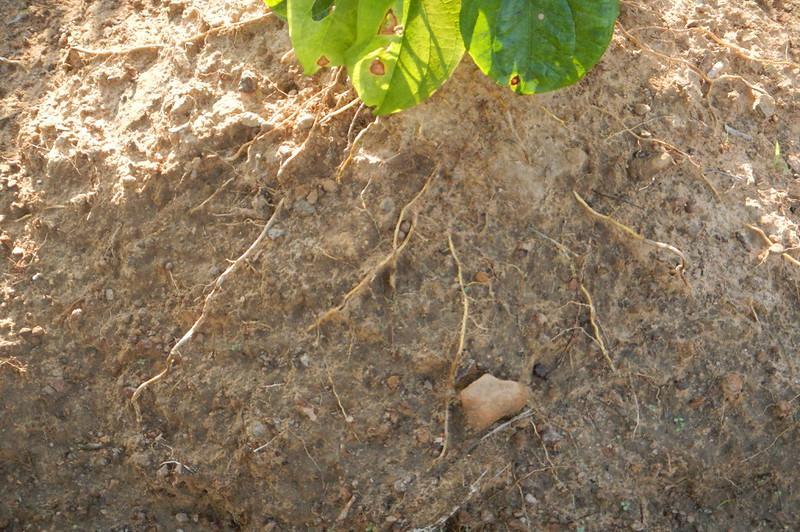
Soil compaction weakens grass, which gives the clover a chance to take over an area.
When the soil is compacted, the grass roots cannot get the water, air, and nutrients they require to develop into healthy plants. In areas of packed, poor soil where grasses wilt and lose their color, clover can grow because of its extensive, interconnected, and very thick root system. Areas of your yard where the grass is thin or has died can be taken over by clover very easily and in no time if given a chance.
Solution
By aerating your lawn on a regular basis, you can break up the soil, which in turn allows the grass roots to flourish and provides more oxygen. Since the grass is growing so well, there won’t be any empty spaces for the clover to occupy.
The frequency of your aeration will be determined by the climate and composition of the soil, but it is generally recommended that you do it once each year.
Why You Might Want Clover To Stay!
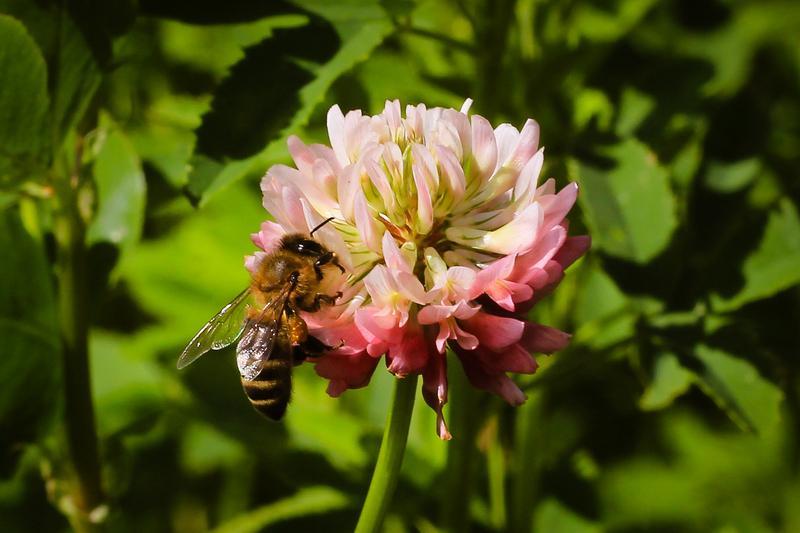
Clover benefits bee populations since it is an excellent nectar source.
If you don’t like the clover look, there are several ways to remove it (described below). If you are prepared to give clover a chance, it can provide several benefits to your lawn.
Take landscaping as an example: if you’re like most homeowners, you’d like to cut down on the amount of time, money, and water you spend on it. Well, a clover lawn could be your solution. How? Continue reading to find out!
Clover Decreases Soil Erosion
As previously stated, clover roots are extremely deep. These deep roots assist the clovers, the soil, and the nutrients remain in place despite the effects of adverse weather. Additionally, the excellent natural aeration that clover roots provide helps to avoid soil compaction. How can this aid in preventing erosion?
When soil is compacted, it increases the likelihood of runoff and erosion. And clover lawns help prevent soil erosion by increasing aeration.
Related: Is Having Micro Clover In Your Lawn Worth It? Pros & Cons Of Micro Clover In Grass!
Clovers Save Money & Time
Compared to grass seeds, clover seeds cost roughly one dollar for every one thousand square feet. Additionally, clover roots function similarly to a living mulch and naturally prevent soil from becoming compacted.
Clover roots also encourage earthworms as their constant tunneling helps maintain loose soil with their deep, decaying roots. That is not all, though!
Lawns that contain clover require less weeding, watering, less fertilization, and less mowing, which saves on time and money spent on lawn care.
Clovers Are Pollinator Friendly
Pollinators like honey bees are drawn to the blossoms of clovers. A lawn containing clover can provide a haven for pollinators, which is especially important now that many pollinator habitats are disappearing. Your garden, the honey crop you produce, and the natural world will all benefit from the presence of honey bees. Just remember to take precautions to avoid getting stung by bees and wasps.
In search of a little something extra? Many species of pollinators serve as a natural form of pest control, which can save you both time and money on lawn pest control.
Clover Lawns Need Less Water
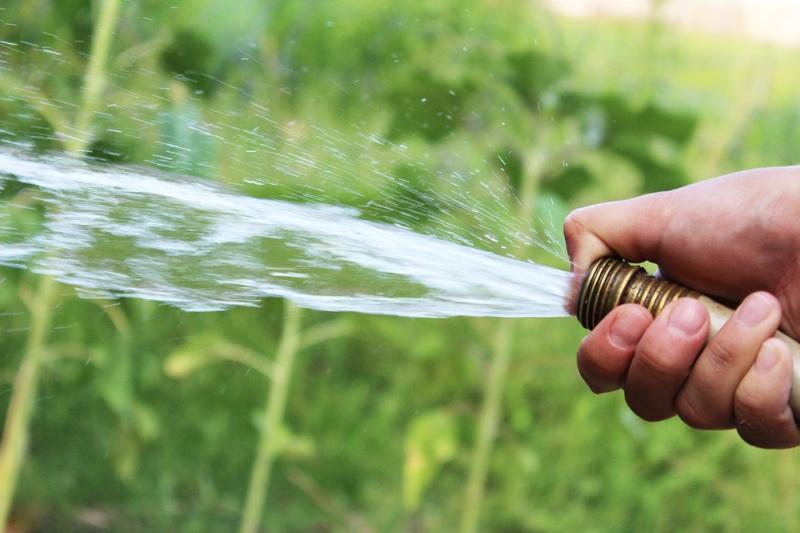
Clovers grow deep roots, which means they will stay green even in drought.
The phrase “Clover will stay green all summer long” is music to the ears of many people who adore their lawns. However, when first planted, clovers, like grass, will require nearly daily watering; once they have established themselves, they will require much less frequent watering for maintenance. Clover roots take a lot less time and effort to reach the water they need since they grow so deeply into the soil. In times of drought, clover maintains its green coloration for a more extended period of time.
Clovers & Grass Benefit Each Other
Clovers are considered companion plants because of their beneficial relationship with grasses. In fact, clover was once thought to be so important for lawns that it was included as a standard, and in some cases even required, component in grass seed mixes.
Even in modern times, there are still numerous lawns and areas where clovers and grass can be found living together in harmony side by side. For example, white clover can tolerate foot activity, but it will do so more effectively if combined with grass.
Clovers Reduce Weeds
Cover crops like clovers are extremely widespread and successful in agriculture and gardening. When cover crops are grown in dense rows, they provide a living mulch that protects the soil from weeds and helps retain moisture.
They also help prevent soil erosion and splashing, as well as keep weeds under control. Clover has the ability to prevent the growth of broadleaf weeds in lawns because it quickly creates clumps that are propagated by stolons.
Clovers are very effective at out-competing other broadleaf plants on lawns, such as dandelions, violets, and other plants that are typically seen on lawns.
Clovers Reduce Lawn Diseases
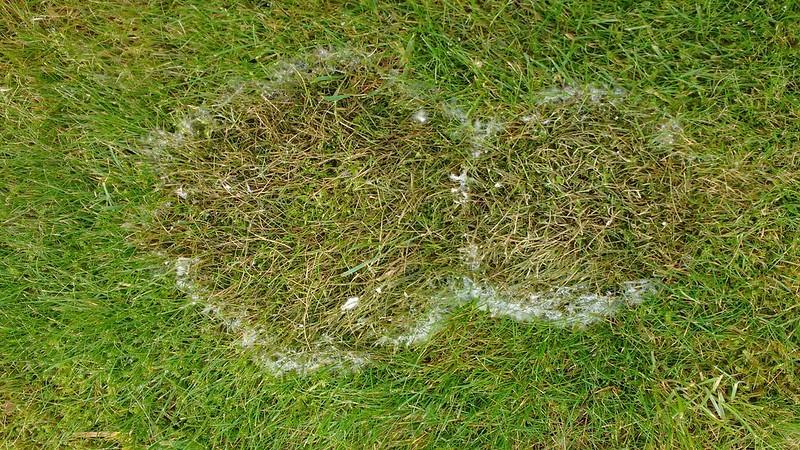
Lawns with clovers are more immune to grass diseases than grass-only lawns.
When you cultivate a positive relationship with clover rather than a hostile one, you reduce the amount of fertilizer, herbicide, and other chemicals that are required to keep disease at bay. This could end up saving you a significant amount of money, not to mention that clover lawns are more environmentally friendly than grass-only lawns.
Clovers might be the answer to the terrible problems caused by lawn illnesses. The trace minerals in the soil are absorbed by clover and accumulated by the plant. When clover decays, it makes the minerals it once contained available to the grass. Thus, clovers make the grass more resistant to disease.
Clovers Reduce Fertilizer Needs
If you are sick and tired of shelling out a tonne of money to buy nitrogen for your lawn, clover can take care of the problem for you. Turfgrass benefits from the addition of clovers because they convert atmospheric nitrogen into usable plant nutrients.
Reducing your use of synthetic fertilizers has environmental benefits as well. It reduces the amount of nutrients that run off into nearby streams and aquatic habitats.
How To Prevent & Control Clover In Your Yard?
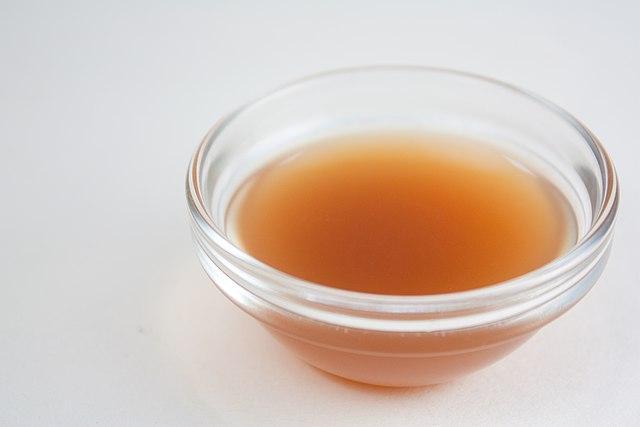
You can easily kill clovers in your yard by making a homemade vinegar spray.
Some homeowners want clover in their grass, while others do not. If you do not, there are a few different approaches you may take eliminate white clover that has started to emerge and spread in places around your yard. The following is a list of the most practical and effective natural methods for preventing and removing clover from your lawn.
Use Corn Meal Gluten
Corn meal gluten causes the soil to become tainted with organic peptides, which stunts the growth of clover. It won’t work on the clovers that have already established themselves in the yard, but it will stop fresh seeds from growing everywhere.
So, if you’ve just reseeded your grass, you should avoid using this method at all costs. Thankfully, this action will not damage the grass in the area. Corn gluten meal is available for purchase both in-person at your neighborhood garden center and online.
Spread Organic Fertilizer
As we already discussed, high nitrogen fertilizers can stunt the growth of clovers. And that is where organic fertilizers come in, as they are rich in nitrogen. Your lawn will be less inviting to clover if you fertilize it with organic fertilizer. The following are the three categories that are typically used to classify organic lawn fertilizers.
Mineral fertilizers contain ingredients like Epsom salt, greensand, and rock phosphorus.
Plant-based fertilizers are manufactured from seaweed, alfalfa meal, grass clippings, gluten, soybean meal, cottonseed meal, kelp, and corn gluten meal, among other things.
Animal-based fertilizers are made from resources such as fish emulsion, shellfish meal, earthworm castings, poultry dung, cow manure, bone meal, and blood meal.
Apply An Organic Herbicide
You could also use A.D.I.O.S., which is a selective organic herbicide that kills clover without harming the grass around it. Simply spraying it on clover will be enough to cause this broadleaf weed to become weak and eventually die.
Related: Why Is Clover Taking Over My Lawn? Possible Causes & Natural Solutions!
Kill Clovers With Vinegar
To get rid of those pesky clovers, try this all-natural formula for a weed killer. In a mixing bowl, add one cup of vinegar, one drop of dish soap and one cup of water. Spray it on any clover patches you locate in your yard after giving it a good shake.
To completely get rid of the clover, you might need to spray several times over the course of several weeks. Be cautious when spraying vinegar on the ground because it can unfortunately also kill the grass and vegetation.
Final Thoughts
Will clover choke your grass? Most likely not. And if you ask me, having a few clover plants in your grass is nothing to be concerned about. What would I recommend? Instead of trying to fix the symptom (the clover), focus on solving the problem (poor soil).
Also, your yard will look much better if you use lime, organic fertilizers, and quality compost to work from the ground up to improve it.
Frequently Asked Questions (FAQs)
Is clover good for the lawn?
There are several benefits to having clover on your lawn. Clover is frequently found in regions with poor soil because it fixes nitrogen-deficient soil. Clover, also referred to as a living mulch or natural fertilizer, feeds the grass by removing nitrogen from the air and soil and converting it to a form that plants can use. And voila! Beautiful grass.
What are the disadvantages of a clover lawn?
Bees will be drawn to clover because of its white blossoms. If you have allergies or if your children and pets enjoy playing on the lawn, this may not be in your favor. Additionally, you might not enjoy the clover’s appearance in your yard. It could appear weedy, uneven, and spotty, especially when clover is expanding quickly.
How long will clover last?
Lawns made with clover typically only last between one to three years, which is significantly less time than those made of turfgrass. Additionally, if the clover is in good condition, there is no reason to kill it and till it under unless you plan to grow something else in the yard.
Does clover come back every year?
Once it has been established, perennial clover consistently returns, making it a superior candidate for use as a ground cover to annual plants that typically need to be reseeded yearly. And, even though perennial clover will produce its own seeds, most of its growth will come from the plant’s creeping root system.
Is clover toxic to dogs?
Yes, clover plants can be hazardous to dogs if consumed in high quantities. While it is possible, it is quite unusual that dogs would consume that many clovers. Additionally, it is uncommon for this plant to cause death when ingested. However, it would help if you still tried to prevent your pet from grazing or tasting any plant material.
Sources For Further Reading
White clover exploding in lawns. (2015). Michigan State University Extension. Retrieved 14 September 2022, from https://www.canr.msu.edu/news/white_clover_exploding_in_lawns
White Clover in Lawns. (2015). The University of Massachusetts Amherst. Retrieved 14 September 2022, from https://ag.umass.edu/turf/fact-sheets/white-clover-in-lawns
Lawns and Micro clover | University of Maryland Extension. (2022). Retrieved 14 September 2022, from https://extension.umd.edu/resource/lawns-and-microclover
Editor’s Recommendations
Brown Spots In The Grass: Causes, Solutions & Prevention | A Comprehensive Guide
How To Start A Lawn Mower With Old Gas? Easy Tips & Tricks From The Experts
What To Do With Grass Clippings | 10 Smart Ways To Recycle Grass Clippings







